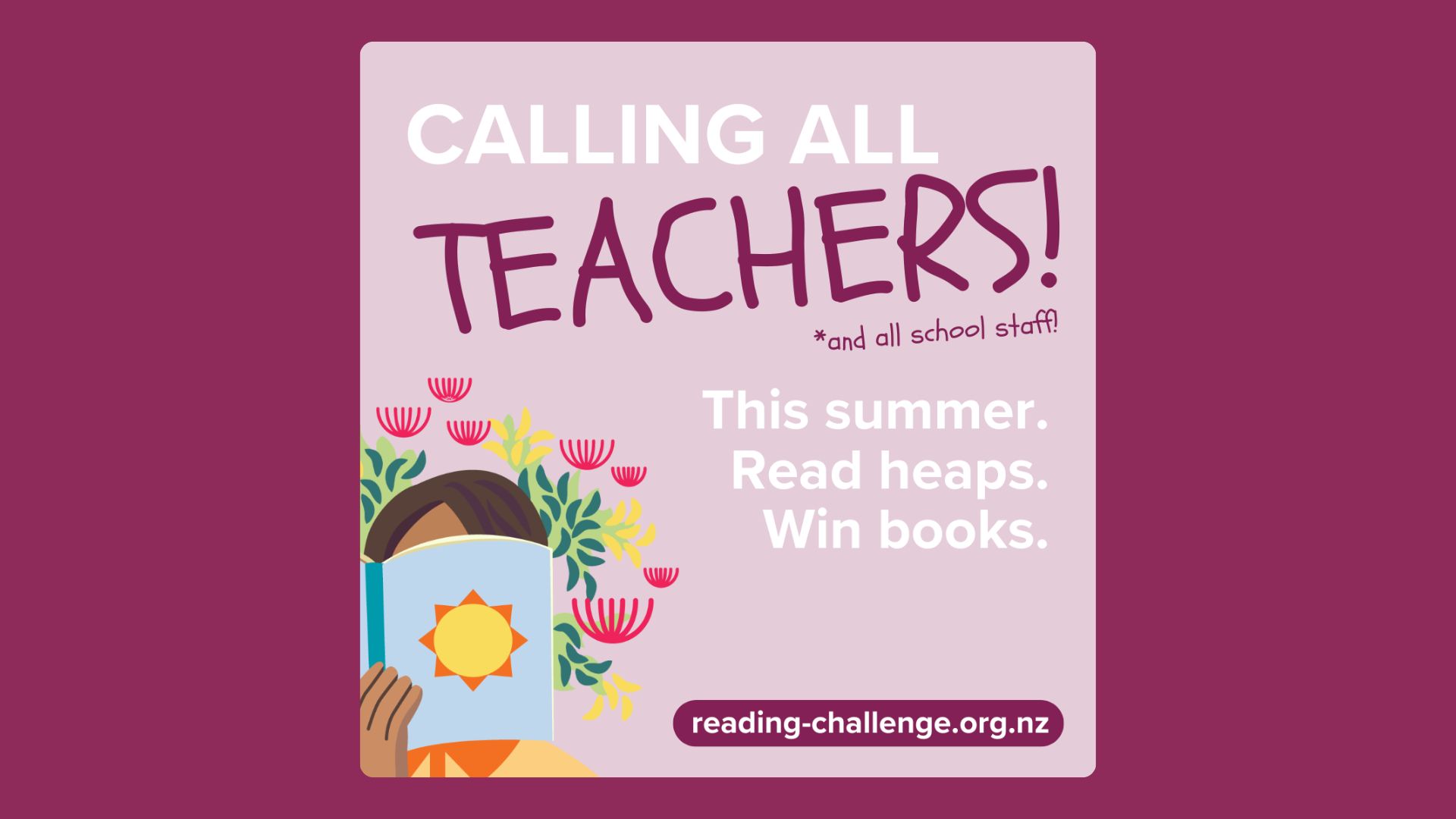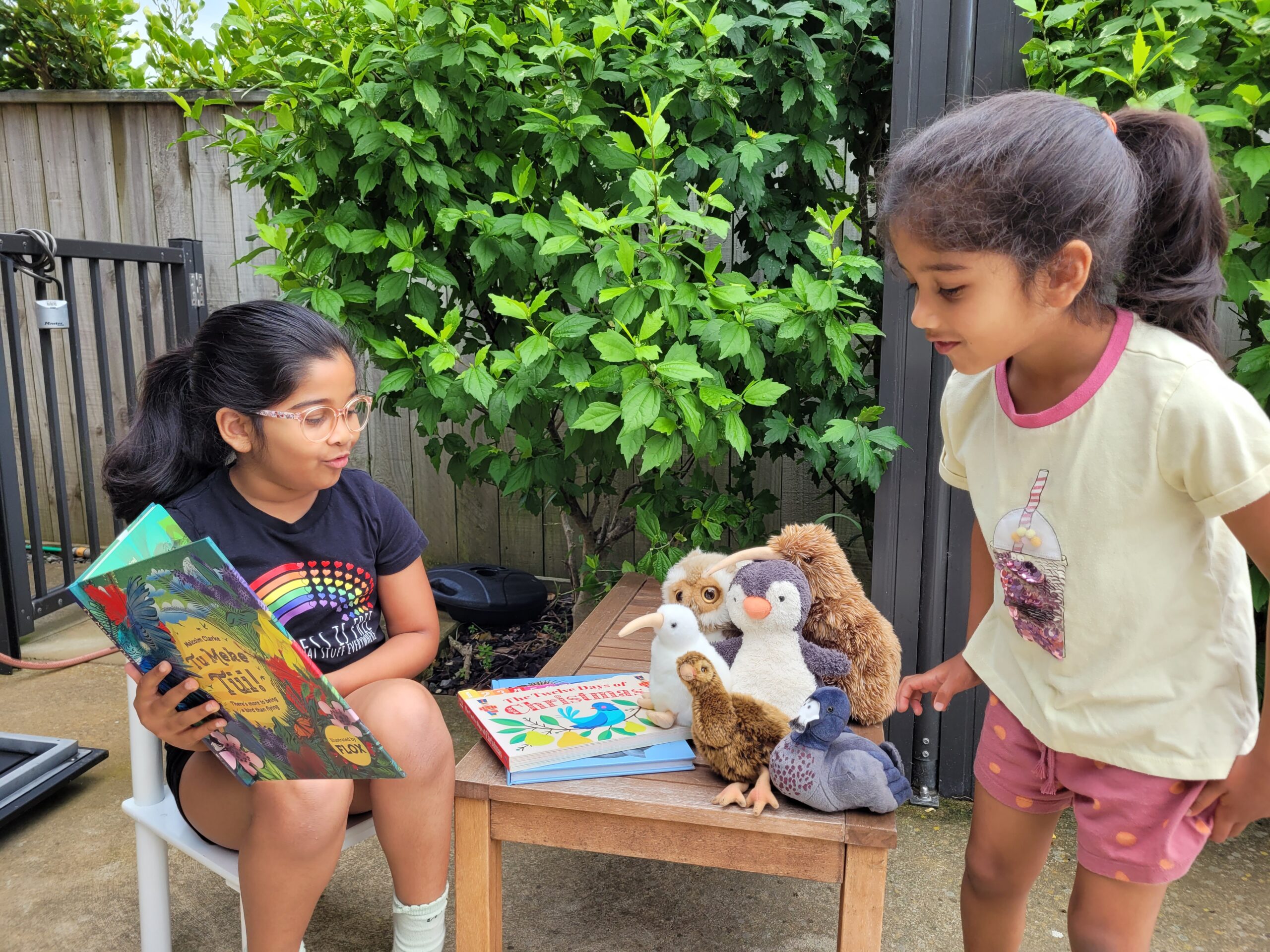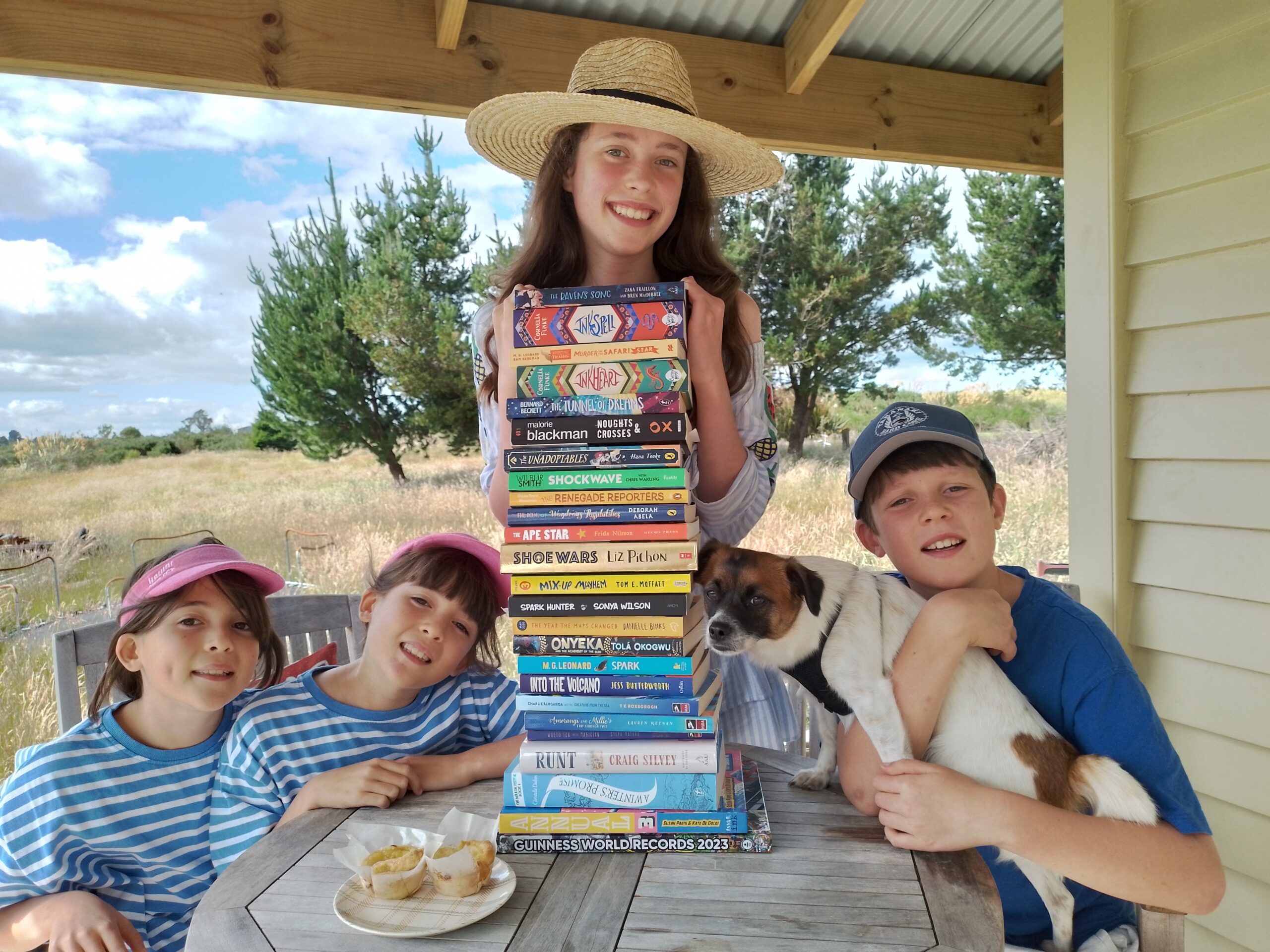Each year, Read New Zealand Te Pou Muramura issues a reading challenge for the summer holidays. This year and last, the wero is aimed at teachers. We chatted with Sarah Dillon, Te Pou Muramura’s Communications and Engagement Manager, to find out what it’s all about.

The Sapling: Tell us a bit about the summer reading challenge?
Sarah Dillon: From 2019–2022, our Summer Reading Challenges worked to help motivate kids from all over Aotearoa New Zealand to read over the summer holidays. There’ve been a few over the years, but the basic concept was the same: hundreds of tamariki aged five and up competed in an online competition where they chose a team based on their age, and logged their books to win great spot prizes, all in the name of reading motivation! We partnered with a number of great like-minded charities to deliver these challenges, including Kiwi Conservation Club, SPCA, and Duffy Books.
TS: The ‘summer reading slide’, where children’s reading gains from the school year are lost over the long summer break, has been documented in New Zealand and overseas. Can you tell us a bit about what we know about that in New Zealand?
SD: Perhaps the most difficult part of the ‘summer slide’ here in Aotearoa is that it echoes international findings in that students from low socio-economic communities or particular cultural groups are disproportionately affected: and this is a barrier to equity that only grows with the students (see this study by University of Auckland and Manurewa South School).
The research is also really interesting because it highlights the influence of the people around tamariki on their reading habits: teachers have a big role to play in terms of preparing students’ access and motivations to summer reading, and of course so do parents and guardians. It really does take a whole village!
Something which also comes up in the literature and is now a part of the NZ English curriculum is ‘reading for pleasure’, one of the phrases we at Te Pour Muramura pin our existence on. And it really is a biggie for students: while skills development or remedial focuses are important, ultimately kids will want to read when they enjoy it, and that brings a whole load of benefits along with it.
Our friends at the National Library have collated some of the international and Aotearoa NZ research on this, and you can investigate it more on their website.
TS: Last year the challenge shifted from targeting children to challenging teachers. Can you tell us about why you made that change?
SD: Just like the summer slide itself, we were starting to see a gradual year on year decline in participation in our Summer Reading Challenges—the last iteration in 2022 had around 300 participants. We took a good look at the sector and realised that there’s a lot of people doing amazing work in this space—for example, the HELL Reading Challenge run by the NZ Book Awards Trust, or the amazing work local libraries do (and they’re so well placed to be able to support tamariki with book access and recommendations, which goes far beyond what we can offer).

Meanwhile, a lot of thinking was starting to come together for us around how we can better support schools in growing holistic reading culture, and the well evidenced importance of teachers as reading role models. We loved the international Teachers Reading Challenge models, like the one run by The Reading Agency and The Open University. And so, we approached Mātātuhi Foundation with this seed of an idea to help promote reading books from Aotearoa NZ within schools and kura, and with their support, the Teachers Reading Challenge was born. Its first iteration last summer attracted 1,151 teachers, and we expect about the same this year with around 900 currently signed up and the number still growing each day.
TS: What do you hope to provoke or inspire in teachers with the challenge?
SD: We’re hoping that the challenge supports the teachers and librarians who are already champions for reading within their school with a framework to get others excited about reading, and creates opportunities for conversations about books in the classroom, staffroom, and everywhere! We also know that it helps incentivise the reading of books and stories from or about Aotearoa NZ, which we’re deeply passionate about.
The challenge is also open to all school staff, not just teachers (we haven’t quite figured out how to encapsulate this in the name yet) and we hope it also serves to validate staff who aren’t necessarily English teachers but who play an important role in supporting reading culture within their school or kura. Last year our individual reading winner was a digital technology teacher who has a small library for students in her classroom.
We all know that reading motivation can be difficult to find sometimes, and we respect the immense time pressures on teachers during the term—we ultimately hope that the challenge supports and motivates them to spend a summer reading. The benefits from having readers as teachers will flow on to ākonga. And finally, we all know teachers are competitive folks, so the incentive of the school leaderboard doesn’t hurt, either!
TS: What’s in it for the teachers?
SD: We’re lucky to be supported by some amazing partners to offer prizes. Read NZ Te Pou Muramura school memberships for 2025 (allowing access to our new resource kit for growing reading culture in your school and our much-loved Writers in Schools programme) are among the key prizes.
Its first iteration last summer attracted 1,151 teachers, and we expect about the same this year …
Our generous friends at Booksellers Aotearoa have contributed book vouchers which are going out to teachers as spot prizes for great reviews every single week. We have class sets of books from amazing publishers like Te Herenga Waka University Press, OneTree House, and Scholastic, and copies of books featured in our Reading Stories from Aotearoa NZ resource from Penguin Random House, Huia, and Auckland University Press, all up for grabs.
TS: What feedback did you get after the 2023 challenge?
SD: Quite honestly, we were absolutely blown away by the challenge feedback. When developing the challenge with our VUW intern Georgia Wearing, we thought we were testing an idea which might bring in 200 or so participants.
By the numbers, 1,151 teachers from 151 schools took part. Seventy percent said they read more over the summer as a result of the challenge. Sixty five percent said they read more books from Aotearoa NZ, and 47% found an Aotearoa NZ text to teach as a result of the challenge (books from Aotearoa NZ gain double points for the challenge, because we care deeply about incentivising reading and teaching of these texts in schools and kura).

Much credit must go to the teachers and librarians who championed the challenge within their schools: they were creating displays in libraries and staff rooms, providing book recommendations and weekly emails for their teams, and all sorts of amazing initiatives. Some of the things they told us were that they’d ‘never talked about books so much at school,’ ‘were blown away by the staff’s efforts and competitiveness,’ and ‘loved waking every morning to read a text by a New Zealand author.’
TS: Do you have anything on offer for families who wish to complete a reading challenge this summer?
SD: Unfortunately not—we’d love to, but we’ve had to accept that our capacity is limited, and this is the space we’ve chosen to work in currently. We are working on some whānau reading resources for next year, though, and would always encourage people to take up the HELL Reading Challenge or to visit their local library to chat about the summer reading challenges they might have on offer!
TS: Is there anything else you’d like to share about Read NZ Te Pou Muramura’s summer reading challenge?
SD: We’re still open for signups, and it’s not too late to get your school team on board!
Learn more about the challenge: read-nz.org/what-we-do/summer-reading-challenge
Or sign up: reading-challenge.org.nz



